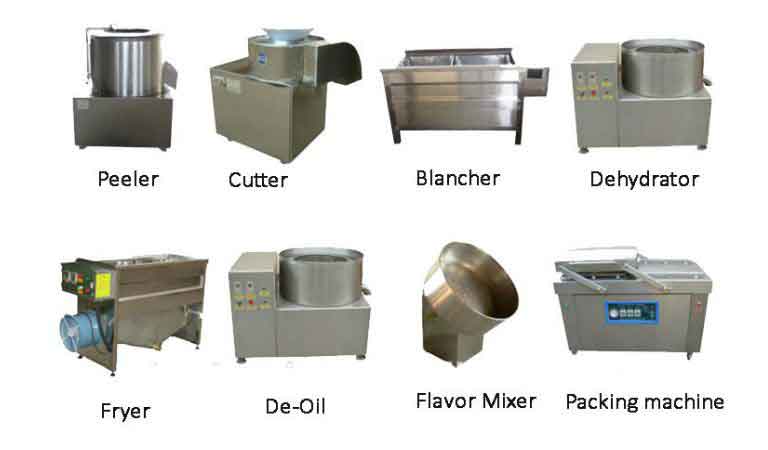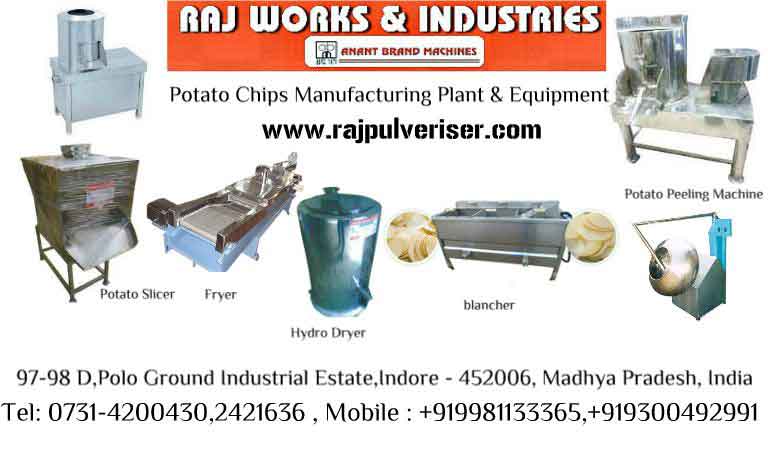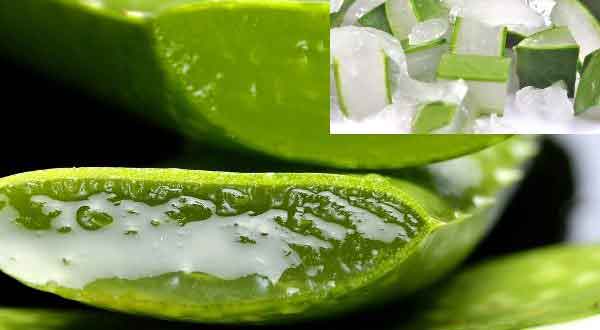Monday, 9 December 2019 / 3:43 PM
Potato Chips Making Business

How To Start A Small Scale Potato Chips manufacturing Business
The popularity of snack food is growing fast day-by-day and potato wafers have emerged as a clear favorite. India is one of the largest producers of potato. Besides being used as a daily food item in various vegetable preparations, potato today increasingly finds use in the form of chips or wafers as snacks food. The potato chips and wafers are popular processed food items that give considerable value addition to potatoes.
Potato chips manufacturing can be done at a small-scale level as well as at large scale level. Capital investment depends on the level of the business starting from INR 2 lakhs. It can be done from a large factory as well as your own residence.
The main consumers of potato chips and wafers are families especially in urban and semi-urban areas. Besides, hotels, restaurants, canteens need potato chips in significant quantities.
Potato Chips Market Potential
In India around 12 million tonnes of potato is grown which is about 4% of the total world production However, the per capita consumption of potatoes is low. It is estimated that 25% of the potatoes, which is spoiled due to several reasons such as transportation, type of packing, availability of cold storage capacities during harvesting season, glut in the market etc. could be saved by making various preserved potato products. Potato chips is one of such products which has an immense potential as this is considered as one of the traditional food of India. Potato chips are needed to be made in a scientific manner and under hygienic conditions.
There is a huge demand to be met for potato chips in interior and remote places in India. It is a good idea to start small and develop the business locally or in a remote area before stepping into the big market, as setting up a large-scale plant will require a lot of capital investment.
Raw Materials required:
The total cost of raw materials depends on the usage of the company. To manufacture 100 kg potato chips, it should cost the entrepreneur around INR 15,000-20,000 approx. or even less, depending on the prices of the product in the area you are sourcing from. The better way would be to source the potatoes from the farmers directly, it will reduce the cost of raw materials considerably.
Potato Chips Manufacturing Legal Compliances
In starting this business, you will need to obtain different registration and licenses from the Govt. authority. Here we put some of the basic requirements. However, it is advisable to check your state law.
Potato Chips Manufacturing Plant & Equipment
You can start this manufacturing business with an area of 600 Sq Ft. In addition, you must provide utilities like electricity and water. Some of the basic required machines are
Potato Chips Manufacturing Process
The manufacturing process of Potato Chips is relatively simple.
Sorting Potatoes:
Firstly, potatoes are sorted as per the requirement, the potatoes selected for wafers should be large oval shape free from disease and fully matured. It should have least number of eyes to cut down the losses by trimming.
Washing & Peeling:
Next, the potatoes are washed thoroughly in water and peeled manually with stainless steel peeler or with the help of an abrasive potato peeling machine, the skin is washed away with sprays of water. Then it is placed in water to prevent browning of the potatoes.
Slicing:
After peeling, they are sliced with the help of a slicing machine in to thin slices which are 0.4 to 0.5 cm thick. The slices are then immersed in cold water.If there is a delay in the next step, the slices are kept in water containing 0.05% potassium meta bi-sulfate to avoid oxidation.
Blanching:
After slicing, the potato slices are blanched for 3 to 5 minutes in boiling water and spread on trays. The inconsistent slices are removed from the batch and then it is moved to frying.
Drying & Frying:
Then the blanched potato slices are dried using spin dryer or hydro extractor to remove excess amount of moisture from the chips. Later, they are fried in Deep fat fryer at 1900 degree Celsius for 3-4 minutes. It is then kept on a sieve to cool and to remove excess of oil.
Flavoring:
Once it is cooled, flavors like salt, spices etc. are sprayed on the chips as per required taste with the help of salting drums.
Packing:
Lastly, the chips are sealed in a plastic bag with the help of vacuum sealing machines and packed in cardboard boxes, then delivered to the clients.
It can even be sold right after blanching and drying. The customers can fry it at their own convenience. The shelf life of the unfried chips are more than the fried chips. In this process, the flavors and spices are added after blanching but before drying.
*It can also be made as a healthy snack by baking the chips in industrial ovens instead of frying it in oil, which reduces the number of calories considerably. It will require an industrial oven for baking the chips.
Profit Margin:
The profit margin depends upon several factors, such as marketing cost, sourcing of materials, manufacturing cost etc. The profit margin in this business should be around 20-30%, that means if you sell 10 kg potato chips at INR 200, the profit will be of INR 40-60.
Investment & Finance:
The entrepreneur will require to invest in the business. The capital investment for a small-scale industry will be around 3-6 lakhs approx. One can even get finance through various sources like nationalized banks, private banks and financial institutions.

Tags

